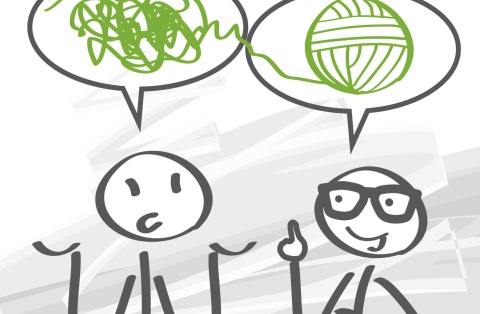Do you like problems?
I doubt anyone would answer yes. But if you challenge yourself into thinking about it, you would realize that problems suffer from a very bad (and unjustified) reputation. Karl Popper, one of the greatest philosophers of science in the modern world, once explained: « The best thing that can happen to a human being is to find a problem, to fall in love with that problem, and to live trying to solve that problem, unless another problem even more loveable appears ».
Beyond the extreme sentimentality, Popper probably wanted us to stop considering problems in a negative way. When most of us link problems with obstacles, threats and other dark episodes in our lives, it is more correct to view them as chances offered to improve our current situations. For Henry Kaiser, the American industrialist, « problems are only opportunities in work clothes ». In other words, the problems we face, either in the workplace or on a personal level, are merely gaps between a present situation and a desired one. The current state, with its performances and outcomes, is perceived as dissatisfactory, because it contrasts with our objectives and expectations. By trying to overcome our problems, we are actually trying to reduce the gap between what we have as current results, and what we expect to have. Once we understand the positive dynamic that problems set on our lives, we are ready to address them properly.
This is what most major companies nowadays have come to realize. Therefore, they are more and more interested in recruiting managers with high problem solving skills, in order to overcome their daily challenges more effectively, and thus increase their competitiveness. This is even more accurate since the economic environment is getting increasingly complex, due to the uncertain economic conditions and market behaviour.
Whether you still study, whether you work as an employee or a manager or even have started your own business, you have to deal with various kinds of problems on a daily basis. One question arises then: how good of a problem solver are you? In the following lines, you will find a list of common requirements that problem solvers provide, which you could check in order to visualize your own strengths and weaknesses related to problem solving. This diagnosis could also be applied within a project team, and will help you manage your skills for optimal results:
- Whatever your professional status and previous experience, effective problem solving requires conviction that the problem can be solved and that you can do it. Thanks to this “can do” attitude, you will be able to stay focused on how to reach your goal instead of brooding over your limitations and deficiencies.
- A second requirement when dealing with problems is to enhance your consultancy skills, in other words, to practice redefining the problem and rephrasing it objectively.
- It is also recommended to use a structured approach when addressing problems. Having a system has actually proved very efficient to save time and efforts and grant satisfactory solutions.
- Moreover, as problem solvers, you need to develop your empathy because it will help you shift perspectives easily and understand the point of view of various stakeholders on the same problem.
- Another quality to enhance is your non-linearity and creativity: it is tempting to compare a current problem‘s symptoms with other problems experienced previously. This is called the experience trap, because one can assume that similar-looking problems have the same causes, and consequently the same solution would apply to both.
- An additional prerequisite is related to consensus: when various parties are involved, it is vital for you to gain their commitment and benefit from their support.
- Keep in mind a final requirement when dealing with a problem, this time related to sustainability: instead of trying to get rid of the problem in near-term, you should seek permanent solutions and have a long-term reasoning in order to avoid that the same problem occurs again. As John Foster Dulles (former US Secretary of State) explained it: « The measure of success is not whether you have a tough problem to deal with, but whether it is the same problem you had last year ».
Some natural-born problem solvers check more items on this list than the average citizen. But even the common mortals can improve their own assets by following some general rules:
- Firstly, you should start by seeing problems as challenges, which implies to take risks, along with having reasonable expectations. Be proactive and enthusiastic, while making sure the final reward is worth the risk. It is not about gambling, but about seizing the opportunities.
- Secondly, do your best to ensure objectivity when analyzing the issue. Following a standardized approach of problem solving will help you optimize your efforts by providing rigorous steps and meticulous tools. Start with thoroughly collecting information about the problem so as it is correctly defined, then analyze the available data to find out the root causes of the problem, then list various alternatives and assess them fairly before choosing the most appropriate one, ultimately implement the selected solution and evaluate its impact on the initial problem.
- Thirdly, open up to new ways of thinking: everyday, the environment evolves, and the older solutions could no longer be relevant. Some current problems are completely unprecedented, and people have to come up with new ideas to solve them. Being open-minded and non-conforming will help you trigger your creativity in a more effective way.
- Fourthly, you need to develop your social skills: other people might be involved in the problem at various levels; they could be part of the problem, and/or part of the solution. In the workplace, you should even be able to spot who cares about the problem and its solution, who can actually help you solve the issue, and who knows something valuable about the situation. Curiosity, empathy and good listening abilities prove useful in this regard, along with being adaptable and flexible.
- Finally, try to forgive yourself if you make mistakes, because slip-ups are an excellent way to learn. Persistence eventually pays off, so have the courage to make decisions. You don’t need to be right all the time, and when you are wrong, accept it light-heartedly and move on!
To sum up, problem solving is a strategy developed to reduce the gap at the origin of the problem, while trying to minimize the risks of error or dissatisfaction. In order to be effective, problem solving requires from us to develop specific attitudes and build particular assets. This is an on-going process of self-improvement, as well as practicing some management tools that could be presented in future articles. The diplomat, educator and author Harlan Cleveland once said: «Leaders are problem solvers by talent and temperament, and by choice».




